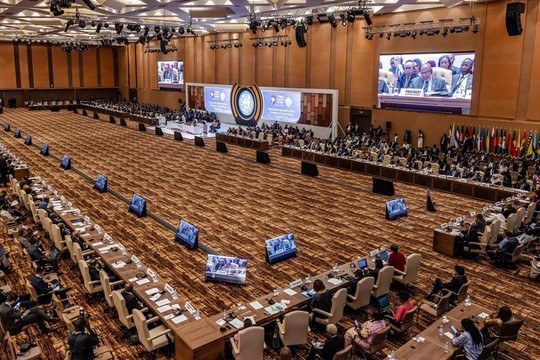The G77 South Summit in Kampala, Uganda.
Photo: CGTN
Chinese Vice-Premier Liu Guozhong wins support, including from UN leaders, for speech calling for overhaul of global systems, writes ‘The South China Morning Post’.
China is rallying the Group of 77 developing countries to push for reform of the global governance system which – according to some leaders in Africa, Asia and Latin America – disproportionately favours the West.
Chinese vice-premier Liu Guozhong said that developing countries “should jointly support the reform of the World Trade Organization (WTO) and the international financial system”.
Liu was speaking in Kampala at the third South Summit – the decision-making body of the 134-country G77 and China, which does not consider itself a member of the grouping. Uganda also assumed chairmanship of the group at the meeting, taking over from Cuba.
China joins a growing list of countries, especially from Africa and Asia, that have been piling on the pressure for a reorganisation of the global political and economic order – especially the UN Security Council and the WTO, as well as the World Bank and the IMF.
The increasing calls for a review of the International Monetary Fund and the World Bank are based on concerns that the structure, location and mandate of the Bretton Woods institutions are no longer fit to deal with changing global trends.
The US played an outsize role in the creation of the IMF and World Bank and continues to command considerable influence, as one of the largest shareholders in both organisations, which are also headquartered in Washington.
Liu’s call to reform the WTO comes a few months after Chinese President Xi Jinping urged more effort in reforming the organisation, which has become the world’s largest goods trader and a key partner for more than 140 countries since China joined in 2003.
Liu, who is attending the summit as Xi’s special representative, said that it was crucial to make international development agencies more efficient in supporting countries in the Global South – broadly categorised as Latin America, Asia, Africa and Oceania.
“The collective rise of the countries of the Global South is unstoppable, yet the unjust and inequitable international political and economic order from the past continues to have lingering effects.”
Liu said that, as part of China’s initiative to reform the global financial system, Beijing had helped to establish the New Development Bank, the Asia Infrastructure Investment Bank and the Silk Road Fund.
These institutions are providing alternative lending for countries that cannot access international financial markets, and have funded multibillion projects in Asia and other overseas markets, he said.
Liu said developing countries, especially those in the Global South, should raise their representation and voices in meaningful ways to tackle the age-old problems of international governance.
Liu highlighted the more than 3,000 belt and road projects, worth more than US$1 trillion, that China has bankrolled around the world in the past decade.
Liu’s sentiments won support among the leaders present, including UN Secretary-General Antonio Guterres, who was also encouraged by Liu to nominate a special envoy for poverty eradication.
In his address, Guterres said the international system is “out of date, out of time, and out of step, reflecting a bygone age when many of your countries were colonised”.
“The United Nations Security Council is paralysed by geopolitical divisions. Its composition does not reflect the reality of today’s world. It must be reformed,” he added.
The UN chief said the global financial system, including the Bretton Woods institutions, had failed to provide a global safety net for developing countries in distress.
But he added that the Summit of the Future, taking place in New York in September, would be considering “deep reforms” to the international financial architecture.
In his first speech as chairman of the G77 and China, Ugandan President Yoweri Museveni rallied the leaders to remain united in their demands to the international community – to support developing countries to urgently address global challenges such as poverty, hunger, the digital divide and climate change.
Since its inception in 1964 as a group of 77 developing countries, the G77 has promoted economic cooperation among its member states. Beijing has provided political and financial support to the grouping since 1994.
read more in our Telegram-channel https://t.me/The_International_Affairs

 11:52 25.01.2024 •
11:52 25.01.2024 •























